Robert Tjarko Lange
Text-to-LoRA: Instant Transformer Adaption
Jun 06, 2025Abstract:While Foundation Models provide a general tool for rapid content creation, they regularly require task-specific adaptation. Traditionally, this exercise involves careful curation of datasets and repeated fine-tuning of the underlying model. Fine-tuning techniques enable practitioners to adapt foundation models for many new applications but require expensive and lengthy training while being notably sensitive to hyper-parameter choices. To overcome these limitations, we introduce Text-to-LoRA (T2L), a model capable of adapting Large Language Models on the fly solely based on a natural language description of the target task. T2L is a hypernetwork trained to construct LoRAs in a single inexpensive forward pass. After training T2L on a suite of 9 pre-trained LoRA adapters (GSM8K, Arc, etc.), we show that the ad-hoc reconstructed LoRA instances match the performance of task-specific adapters across the corresponding test sets. Furthermore, T2L can compress hundreds of LoRA instances and zero-shot generalize to entirely unseen tasks. This approach provides a significant step towards democratizing the specialization of foundation models and enables language-based adaptation with minimal compute requirements. Our code is available at https://github.com/SakanaAI/text-to-lora
The AI Scientist-v2: Workshop-Level Automated Scientific Discovery via Agentic Tree Search
Apr 10, 2025

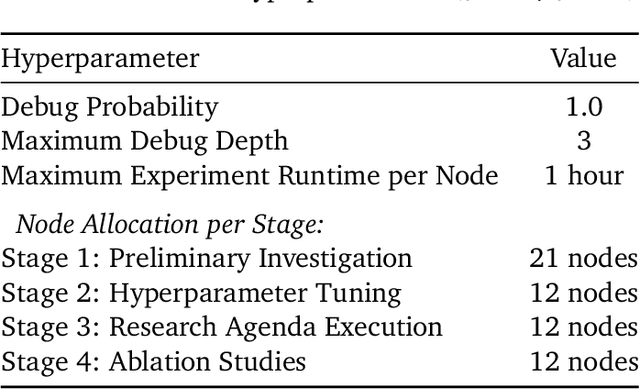
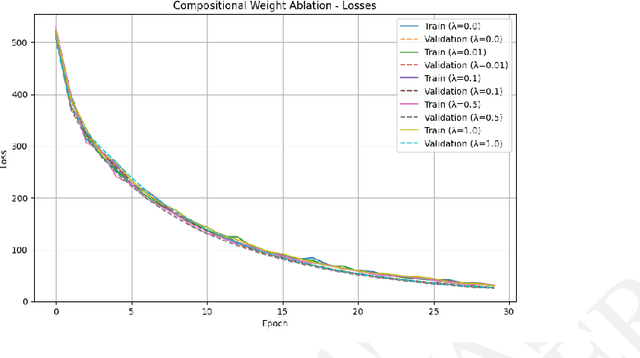
Abstract:AI is increasingly playing a pivotal role in transforming how scientific discoveries are made. We introduce The AI Scientist-v2, an end-to-end agentic system capable of producing the first entirely AI generated peer-review-accepted workshop paper. This system iteratively formulates scientific hypotheses, designs and executes experiments, analyzes and visualizes data, and autonomously authors scientific manuscripts. Compared to its predecessor (v1, Lu et al., 2024 arXiv:2408.06292), The AI Scientist-v2 eliminates the reliance on human-authored code templates, generalizes effectively across diverse machine learning domains, and leverages a novel progressive agentic tree-search methodology managed by a dedicated experiment manager agent. Additionally, we enhance the AI reviewer component by integrating a Vision-Language Model (VLM) feedback loop for iterative refinement of content and aesthetics of the figures. We evaluated The AI Scientist-v2 by submitting three fully autonomous manuscripts to a peer-reviewed ICLR workshop. Notably, one manuscript achieved high enough scores to exceed the average human acceptance threshold, marking the first instance of a fully AI-generated paper successfully navigating a peer review. This accomplishment highlights the growing capability of AI in conducting all aspects of scientific research. We anticipate that further advancements in autonomous scientific discovery technologies will profoundly impact human knowledge generation, enabling unprecedented scalability in research productivity and significantly accelerating scientific breakthroughs, greatly benefiting society at large. We have open-sourced the code at https://github.com/SakanaAI/AI-Scientist-v2 to foster the future development of this transformative technology. We also discuss the role of AI in science, including AI safety.
Discovering Quality-Diversity Algorithms via Meta-Black-Box Optimization
Feb 04, 2025



Abstract:Quality-Diversity has emerged as a powerful family of evolutionary algorithms that generate diverse populations of high-performing solutions by implementing local competition principles inspired by biological evolution. While these algorithms successfully foster diversity and innovation, their specific mechanisms rely on heuristics, such as grid-based competition in MAP-Elites or nearest-neighbor competition in unstructured archives. In this work, we propose a fundamentally different approach: using meta-learning to automatically discover novel Quality-Diversity algorithms. By parameterizing the competition rules using attention-based neural architectures, we evolve new algorithms that capture complex relationships between individuals in the descriptor space. Our discovered algorithms demonstrate competitive or superior performance compared to established Quality-Diversity baselines while exhibiting strong generalization to higher dimensions, larger populations, and out-of-distribution domains like robot control. Notably, even when optimized solely for fitness, these algorithms naturally maintain diverse populations, suggesting meta-learning rediscovers that diversity is fundamental to effective optimization.
The AI Scientist: Towards Fully Automated Open-Ended Scientific Discovery
Aug 15, 2024



Abstract:One of the grand challenges of artificial general intelligence is developing agents capable of conducting scientific research and discovering new knowledge. While frontier models have already been used as aides to human scientists, e.g. for brainstorming ideas, writing code, or prediction tasks, they still conduct only a small part of the scientific process. This paper presents the first comprehensive framework for fully automatic scientific discovery, enabling frontier large language models to perform research independently and communicate their findings. We introduce The AI Scientist, which generates novel research ideas, writes code, executes experiments, visualizes results, describes its findings by writing a full scientific paper, and then runs a simulated review process for evaluation. In principle, this process can be repeated to iteratively develop ideas in an open-ended fashion, acting like the human scientific community. We demonstrate its versatility by applying it to three distinct subfields of machine learning: diffusion modeling, transformer-based language modeling, and learning dynamics. Each idea is implemented and developed into a full paper at a cost of less than $15 per paper. To evaluate the generated papers, we design and validate an automated reviewer, which we show achieves near-human performance in evaluating paper scores. The AI Scientist can produce papers that exceed the acceptance threshold at a top machine learning conference as judged by our automated reviewer. This approach signifies the beginning of a new era in scientific discovery in machine learning: bringing the transformative benefits of AI agents to the entire research process of AI itself, and taking us closer to a world where endless affordable creativity and innovation can be unleashed on the world's most challenging problems. Our code is open-sourced at https://github.com/SakanaAI/AI-Scientist
NAVIX: Scaling MiniGrid Environments with JAX
Jul 28, 2024



Abstract:As Deep Reinforcement Learning (Deep RL) research moves towards solving large-scale worlds, efficient environment simulations become crucial for rapid experimentation. However, most existing environments struggle to scale to high throughput, setting back meaningful progress. Interactions are typically computed on the CPU, limiting training speed and throughput, due to slower computation and communication overhead when distributing the task across multiple machines. Ultimately, Deep RL training is CPU-bound, and developing batched, fast, and scalable environments has become a frontier for progress. Among the most used Reinforcement Learning (RL) environments, MiniGrid is at the foundation of several studies on exploration, curriculum learning, representation learning, diversity, meta-learning, credit assignment, and language-conditioned RL, and still suffers from the limitations described above. In this work, we introduce NAVIX, a re-implementation of MiniGrid in JAX. NAVIX achieves over 200 000x speed improvements in batch mode, supporting up to 2048 agents in parallel on a single Nvidia A100 80 GB. This reduces experiment times from one week to 15 minutes, promoting faster design iterations and more scalable RL model development.
Behaviour Distillation
Jun 21, 2024



Abstract:Dataset distillation aims to condense large datasets into a small number of synthetic examples that can be used as drop-in replacements when training new models. It has applications to interpretability, neural architecture search, privacy, and continual learning. Despite strong successes in supervised domains, such methods have not yet been extended to reinforcement learning, where the lack of a fixed dataset renders most distillation methods unusable. Filling the gap, we formalize behaviour distillation, a setting that aims to discover and then condense the information required for training an expert policy into a synthetic dataset of state-action pairs, without access to expert data. We then introduce Hallucinating Datasets with Evolution Strategies (HaDES), a method for behaviour distillation that can discover datasets of just four state-action pairs which, under supervised learning, train agents to competitive performance levels in continuous control tasks. We show that these datasets generalize out of distribution to training policies with a wide range of architectures and hyperparameters. We also demonstrate application to a downstream task, namely training multi-task agents in a zero-shot fashion. Beyond behaviour distillation, HaDES provides significant improvements in neuroevolution for RL over previous approaches and achieves SoTA results on one standard supervised dataset distillation task. Finally, we show that visualizing the synthetic datasets can provide human-interpretable task insights.
Discovering Preference Optimization Algorithms with and for Large Language Models
Jun 12, 2024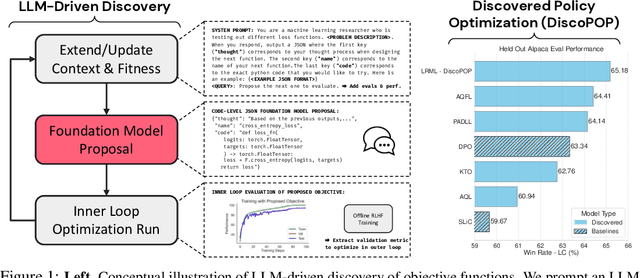


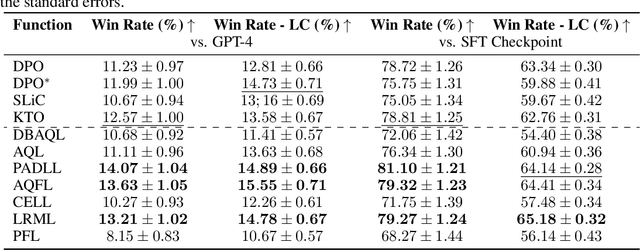
Abstract:Offline preference optimization is a key method for enhancing and controlling the quality of Large Language Model (LLM) outputs. Typically, preference optimization is approached as an offline supervised learning task using manually-crafted convex loss functions. While these methods are based on theoretical insights, they are inherently constrained by human creativity, so the large search space of possible loss functions remains under explored. We address this by performing LLM-driven objective discovery to automatically discover new state-of-the-art preference optimization algorithms without (expert) human intervention. Specifically, we iteratively prompt an LLM to propose and implement new preference optimization loss functions based on previously-evaluated performance metrics. This process leads to the discovery of previously-unknown and performant preference optimization algorithms. The best performing of these we call Discovered Preference Optimization (DiscoPOP), a novel algorithm that adaptively blends logistic and exponential losses. Experiments demonstrate the state-of-the-art performance of DiscoPOP and its successful transfer to held-out tasks.
Position: Leverage Foundational Models for Black-Box Optimization
May 09, 2024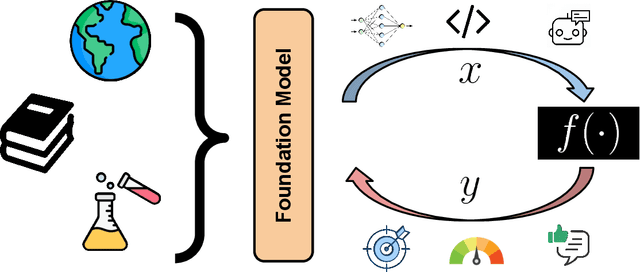



Abstract:Undeniably, Large Language Models (LLMs) have stirred an extraordinary wave of innovation in the machine learning research domain, resulting in substantial impact across diverse fields such as reinforcement learning, robotics, and computer vision. Their incorporation has been rapid and transformative, marking a significant paradigm shift in the field of machine learning research. However, the field of experimental design, grounded on black-box optimization, has been much less affected by such a paradigm shift, even though integrating LLMs with optimization presents a unique landscape ripe for exploration. In this position paper, we frame the field of black-box optimization around sequence-based foundation models and organize their relationship with previous literature. We discuss the most promising ways foundational language models can revolutionize optimization, which include harnessing the vast wealth of information encapsulated in free-form text to enrich task comprehension, utilizing highly flexible sequence models such as Transformers to engineer superior optimization strategies, and enhancing performance prediction over previously unseen search spaces.
Position Paper: Leveraging Foundational Models for Black-Box Optimization: Benefits, Challenges, and Future Directions
May 06, 2024



Abstract:Undeniably, Large Language Models (LLMs) have stirred an extraordinary wave of innovation in the machine learning research domain, resulting in substantial impact across diverse fields such as reinforcement learning, robotics, and computer vision. Their incorporation has been rapid and transformative, marking a significant paradigm shift in the field of machine learning research. However, the field of experimental design, grounded on black-box optimization, has been much less affected by such a paradigm shift, even though integrating LLMs with optimization presents a unique landscape ripe for exploration. In this position paper, we frame the field of black-box optimization around sequence-based foundation models and organize their relationship with previous literature. We discuss the most promising ways foundational language models can revolutionize optimization, which include harnessing the vast wealth of information encapsulated in free-form text to enrich task comprehension, utilizing highly flexible sequence models such as Transformers to engineer superior optimization strategies, and enhancing performance prediction over previously unseen search spaces.
Evolution Transformer: In-Context Evolutionary Optimization
Mar 05, 2024



Abstract:Evolutionary optimization algorithms are often derived from loose biological analogies and struggle to leverage information obtained during the sequential course of optimization. An alternative promising approach is to leverage data and directly discover powerful optimization principles via meta-optimization. In this work, we follow such a paradigm and introduce Evolution Transformer, a causal Transformer architecture, which can flexibly characterize a family of Evolution Strategies. Given a trajectory of evaluations and search distribution statistics, Evolution Transformer outputs a performance-improving update to the search distribution. The architecture imposes a set of suitable inductive biases, i.e. the invariance of the distribution update to the order of population members within a generation and equivariance to the order of the search dimensions. We train the model weights using Evolutionary Algorithm Distillation, a technique for supervised optimization of sequence models using teacher algorithm trajectories. The resulting model exhibits strong in-context optimization performance and shows strong generalization capabilities to otherwise challenging neuroevolution tasks. We analyze the resulting properties of the Evolution Transformer and propose a technique to fully self-referentially train the Evolution Transformer, starting from a random initialization and bootstrapping its own learning progress. We provide an open source implementation under https://github.com/RobertTLange/evosax.
 Add to Chrome
Add to Chrome Add to Firefox
Add to Firefox Add to Edge
Add to Edge